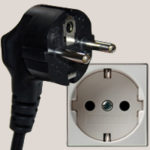Know before you go
Spain
General Information
Spain is located on the Iberian Peninsula in Europe bordering Portugal, Andorra and France. Its capital and largest city is Madrid. Spain is both a member of the European Union and the Schengen Agreement. They drive on the right side of the road.
Visa
Holders of a EU passport don’t require a Visa. For holders of a different passport check out this link to see if you are required to apply for a visa or not or contact your ministery of foreign affairs.

Power
Spain uses Type F plug outlets („Schuko“). They also work with Type C and E. The voltage is 230 Volt and the frequency is 50 Hz
Language
No surprise, the official language of Spain is Spanish. They have Co-official languages (Catalan, Galician, Basque and Occitan) in certain parts of the country. You can get by with English just fine though.
| Spanish | English |
|---|---|
| ¡Hola! | Hello! |
| ¡Adiós! | Bye! |
| sí | yes |
| no | no |
| ¡Gracias! | Thank you! |
| ¡De nada! | You're welcome! |
| Disculpe! | Excuse me! |
| Salud! | Cheers! |
Weather Forecast
Climate
The Mediterranean climate, characterised by warm/hot and dry summers, is dominant in the peninsula. In the southeastern quarter of the country you will find semi-arid climate, while in the in the northern quarter of the country you will find oceanic climate.
Average Temperature in Madrid
Average Precipitation in Madrid
Transportation
How to get there?
The largest airports in Spain are Adolfo Suárez Madrid–Barajas Airport (MAD) in Madrid and Barcelona El Prat Airport (BCN). As it its a popular tourist destination also Palma de Mallora Airport (PMI) is well served by airlines all over Europe. Follow this link to find a list of all airports in Spain.
It is also possible to take a bus or train from Portugal or France, but due to the size of the country and the Pyrenees at the border to France, the jurney can be long.
Money, Money, Money

Currency
Spain is part of the Eurozone and therefore uses the Euro as its currency. Check out the currency converter to find out about current exchange rates.
Accommodation
Depending on where you are staying prices will vary of course. Expect to be paying around 35€ per person per night.
Cash
Even though credit cards are widely accepted, you should still withdraw Euros at an ATM. Cash is still king in many places like restaurants, markets and small shops. How much you will need of course depends on your spending habits. Expect to need around 30€ per day for food, transportation, activities and souvenirs.


